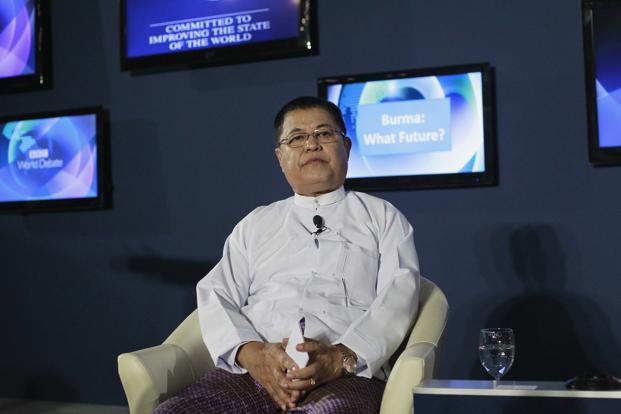 |
| U Soe Thane, union minister in the office of Myanmar’s president Thien Sien. Photo: Reuters |
The twin moves, apart from protecting the environment, will help Myanmar attract foreign companies and boost its image as using energy sources in a sustainable manner, top policy makers in the country said.
Myanmar’s decision to join EITI comes in the backdrop of allegations about multi-billion contracts being awarded in an opaque manner.
“There is a level playingground for international firms. There is no problem with Indian or companies from other countries investing in our resource space. Ours is a transparent process wherein international tenders are called and due process followed,” U Soe Thane, union minister in the office of Myanmar’s president Thien Sien, said in an interview.
Given the concerns over environmental damage due to large infrastructure projects, Myanmar plans to issue rules and regulations for environmental protection, wherein practices such as environmental impact assessment (EIA) will be made mandatory.
These concerns forced the government to drop the ambitious hydro-power projects that both India and China had plans to develop in Myanmar.
Even as Myanmar has hydroelectric power potential of around 100,000 MW, of which around 39,720 MW has been identified for development, practices such as EIA and social impact assessment (SIA) haven’t been followed.
The country has an installed power-generation capacity of 6,300 MW, of which hydro-power generation capacity is 2,500 MW. It also has a low per capita electricity consumption of 100 units.
In response to a question about resource-based industries following dubious practices to gain mineral wealth, U Soe Thane said, “We are joining the EITI process. There will be no problem.”
“It is true that we have to rely on resources as a basis for growth. However, we are protecting the environment. We are now trying to be a member of EITI for being transparent,” added U Win Tun, Myanmar’s minister for environmental conservation and forestry.
There have been instances in the past where forests in Myanmar were destroyed to build large infrastructure but these projects eventually didn’t take off.
There is considerable interest in Myanmar’s energy sector from neighbouring countries, which include China and India, both fast-growing major economies. Myanmar holds 7.8 trillion cubic feet (tcf) of gas. However, among issues hindering investment in Myanmar’s hydrocarbon industry is the limited availability of information and data.
Of Myanmar’s overall trade of around $19 billion, China accounts for around $5 billion, and India $2 billion. Of this latter, exports account for $542.7 million and imports $1.4 billion.
“Myanmar’s move to be a part of EITI is a welcome step. Transparency is particularly important for this sector,” said Stephen P. Groff, vice-president, operations, Asian Development Bank.
On the development versus environment debate raging within Myanmar, U Win Tun said, “We have to have development but also pay attention to the environment. Paying attention to environment is unavoidable. We have to strike the balance between environment and development.” Myanmar’s $53 billion economy is expected to grow to $90 billion by 2018. “We have to manage this rapid pace of change in a step-by-step manner. This involves meeting with the people all the time. It also involves meeting with the civil society,” said U Soe Thane.
The South-East Asian nation scrapped two hydroelectric projects being planned with India’s assistance at Tamanthi and Shwezaye on the Chindwin river in Myanmar due to the social effects associated with the resettlement of people on account of these projects being high, Mint reported on 6 June. Similarly, the country has suspended the construction of the controversial Myitsone dam project that China was helping it build.
“We are going to use our resources very systematically. Also, we are very cautious in using our resources in such a manner to not to use them excessively and passing on the benefits of such resources to our people. We are using that money for the betterment of our people. We are going to use the benefits from the resource based economy for the development of the environment,” said U Win Tun in reply to a question about difficulties in striking such a balance in a resource-rich economy.
According to a McKinsey report, Myanmar needs $650 billion of investment by 2030 to support growth. Of this, $320 billion is required in infrastructure.
“We have already enacted our environment protection law and the rules and regulations will come out within one month time. So, therefore, in the future whatever we do in respect to environment and forest, we will do it in accordance to policy and law,” said U Win Tun. “We won’t allow any company to go beyond that law. We had drafted the law in 2000. However, we could not finalise the policy and draft during the previous government’s period. However, when the new government assumed office, the president said that this is the first thing that you have to do as it is very important.”
